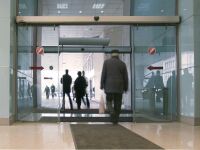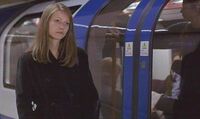Door (automatic sliding)
An automatic sliding door[1] is a door which will open when you approach it and close after you have entered.
Operation[edit]
Automatic sliding doors consist of two major components: the sliding door and associated mechanism, and the proximity sensor. Operation is very simple, and proceeds as follows: when the proximity sensor detects an object in its field of view, the door closes. Should the proximity sensor detect an object in a position that blocks the sliding door's path, the door closes with double the normal strength. It can break your bones if you're not too careful.
Modern sliding doors include software to ensure safe operation. For example: if the proximity sensor continues to detect an object blocking the sliding door's path, but the sliding door is unable to move to the closed position, the sliding door will begin performing a rapid open-and-close motion. This motion is used to clear the sliding door's path in order to prevent objects from being stuck in the sliding door's path.
History[edit]
Automatic sliding doors were the brainchild of Harriet Beecher Stowe, an American author, who reportedly came up with the idea immediately after publishing her anti-slavery novel Uncle Tom's Cabin in 1852 (it is unclear how these two events are related). Reception to Stowe's invention was widely negative, due to a lack of publicly available electricity at the time, which was required to run the device.
Stowe petitioned to the US government in 1863, requesting electricity to be made more readily accessible. The government ignored her petition, as the then-ongoing civil war was slightly higher on their priorities (That's Bureaucracy for you, terrible system).
Stowe's petition was recognized in the latter half of the 19th century, with the US government employing engineers such as Thomas Edison and Nikola Tesla researching electricity to realize Stowe's invention.
A study, following Stowe's death, was conducted to assess public views on Automatic sliding doors. Reception was yet again negative, the sample included responses from many such people; George Washington, Elon Musk, Britney Spears, Gwyneth Paltrow, a group of Lemmings, the SPCA, Zombie Harriet Beecher Stowe, and God himself.
Usage[edit]
Automatic sliding doors have many versatile uses:
- Within hospitals, to ease movement to emergency areas
- On entrances to small cafes, to maximize draft
- In front of libraries, to create a modern feel, even though libraries are quickly becoming some of the most non-modern and unneeded buildings in many cities
- In immigration centers, to discourage third-world refugees
- As a trap to crush people
Additionally, two sliding doors placed one after the other creates an airlock (which passes all of NASA's rigorous standards in becoming a full-vacuum, human rated airlock)
Prophecy[edit]
Jesus said (according to St. Peter's Letter to his Aunt Agatha) that he was a 'door to God's Heavenly Kingdom'.
In popular culture[edit]
Sliding Door Simulator, 1987, is a video game created by teenage Bill Gates. It is the only thing he is famous for.
An automatic sliding door was found by James Cameron at the bottom of the Mariana Trench, on his 2012 expedition.
Footnotes[edit]
- ↑ Not to be confused with Door (Non-Automatic sliding), Door (Semi-Automatic sliding), Door (Automatic sliding (open-sourced)), Door (sliding), Door (rotating), Door (Conventional), Door (Traditional), Door (Neo-Traditional), Door (Peninsula), Door County (Wisconsin), Door Creek (Wisconsin), The Doors (Band), Doors (Album, 1972), Door (Album, 2008), Sliding Doors (1998 film), The Doors (1991 film), Door (Unix inter-process communication facility), Door (character), The Wittenburg Door (magazine), or Door

